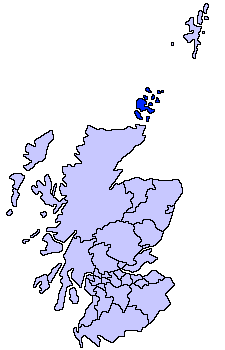Whisky Catalog by Alternative Whisky Academy
This is a whisky catalog with information about the different types of Whisky, Whiskey and Bourbon, sorted by contry.
If you want to buy whisky please check this page to find a whisky shop -> http://www.awa.dk/whisky/wshops/index.htm
Sorry but have an estimated +5000 pages to convert and only +1000 reached ... (Working hard to update all pages).
AWA - Alternative Whisky Academy is a private, none-commercial, no-profit, none-selling whisky society. (Private owner for private usage.)
We do NOT sell whisky or anything else.
Orkney
|
Orkney Arcaibh |
|||||
|---|---|---|---|---|---|
|
|||||
| Location | |||||
 |
|||||
| Geography | |||||
| Area | Ranked 16th | ||||
| - Total | 990 km² (382 sq mi) | ||||
| Admin HQ | Kirkwall | ||||
| ISO 3166-2 | GB-ORK | ||||
| ONS code | 00RA | ||||
| Demographics | |||||
| Population | Ranked 32nd | ||||
| - Total (2008) | 19,900 | ||||
| - Density | 20 /km2 (52 /sq mi) | ||||
| Politics | |||||
|
Orkney Islands Council http://www.orkney.gov.uk/ |
|||||
| Control | Independent | ||||
| MPs | |||||
| MSPs | |||||
Orkney (Scottish Gaelic: Arcaibh[1][2]) also known as the Orkney Islands (and sometimes incorrectly as "The Orkneys"[Notes 1]), is an archipelago in northern Scotland, situated 16 kilometres (10 mi) north of the coast of Caithness. Orkney comprises approximately 70 islands of which 20 are inhabited.[5][6] The largest island, known as the "Mainland" has an area of 523.25 square kilometres (202.03 sq mi) making it the sixth largest Scottish island[7] and the tenth-largest island in the British Isles. The largest settlement and administrative centre is Kirkwall.[8]
The name "Orkney" dates back to the 1st century BC or earlier, and the islands have been inhabited for at least 8,500 years. Originally occupied by Mesolithic and Neolithic tribes and then by the Picts, Orkney was invaded and then forcibly annexed by Norway in 875 and settled by the Norse. It was subsequently annexed to the Scottish Crown in 1472, following the failed payment of a dowry for James III's bride, Margaret of Denmark.[9] Orkney contains some of the oldest and best-preserved Neolithic sites in Europe, and the "Heart of Neolithic Orkney" is a designated UNESCO World Heritage Site.
Orkney is one of the 32 council areas of Scotland, a constituency of the Scottish Parliament, a lieutenancy area, and a former county. The local council is Orkney Islands Council, one of only three Councils in Scotland with a majority of elected members who are independents.[Notes 2]
In addition to the Mainland, most of the islands are in two groups, the North and South Isles, all of which have an underlying geological base of Old Red Sandstone. The climate is mild and the soils are extremely fertile, most of the land being farmed. Agriculture is most important sector of the economy and the significant wind and marine energy resources are of growing importance. The local people are known as Orcadians and have a distinctive dialect and a rich inheritance of folklore. There is an abundance of marine and avian wildlife.
http://en.wikipedia.org/wiki/Orkney
Only part of Scotland for the last 500 or so years, Orkney feels like it’s a long way from anywhere else. The windswept collection of 70 small islands lies off the notherern coast of Scotland and is home to the most northerly outpost of whisky making in the world. Two distilleries vie for the honour of the furthest north; Highland Park and Scapa, the winner by about 300mtrs is Highland Park
Many whisky enthusiasts consider Highland Park to be the best all-rounder there is. It manages to combine a richness and elegance, which appeals to lovers of Speysides; with just enough peat to keep the lovers of Islays interested.
Scapa was opened in 1885, it was silent for two years from 1934 and was owned for a time by the owners of Glen Scotia distillery in Campbeltown. Scapa was rebuilt in 1959 and internal improvements were made in 1978.
The water used is naturally very peaty, as a result the malt is left unpeated. The distillery has a single pair of stills, which date from 1978 and one of them is of the Lomond type, a rare feature. It has a short, stubby top instead of the elongated conical heads customary in Scottish distilleries




